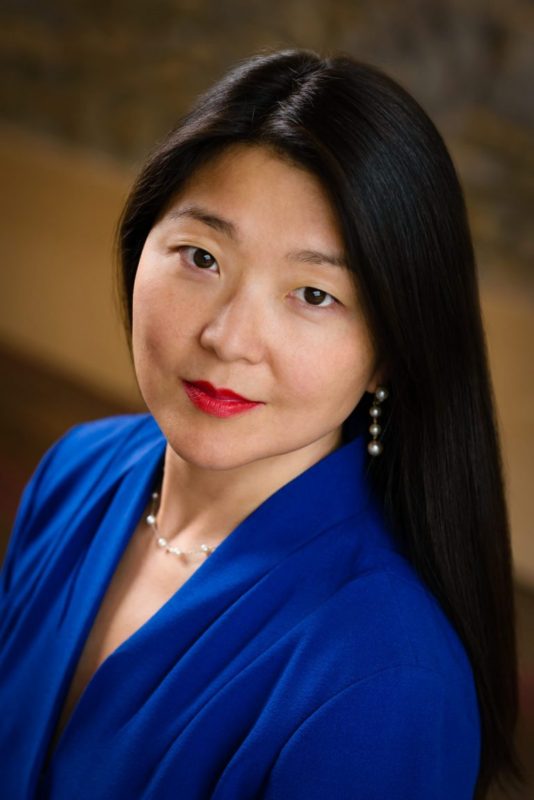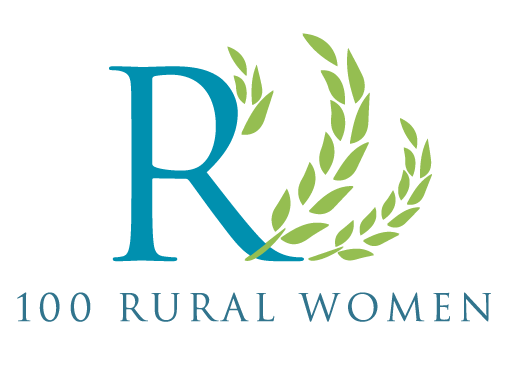“It is not power over or power under, it is power with; a deep understanding of our mutuality.“
Kara Inae Carlisle is the Vice President of Programs for the McKnight Foundation based in Minneapolis. The McKnight Foundation has been committed to statewide investments and programs for years. The organization focuses on equity globally and climate action through all its work. They invest in arts, culture, and international work. You can learn more here: https://www.mcknight.org/ Carlisle has been involved in 100 Rural Women both as a guest speaker and attendee since it was founded.
We are so fortunate to have Kara in our community at 100 Rural Women and to have had the opportunity to speak with her for our Spotlight Profile Series.
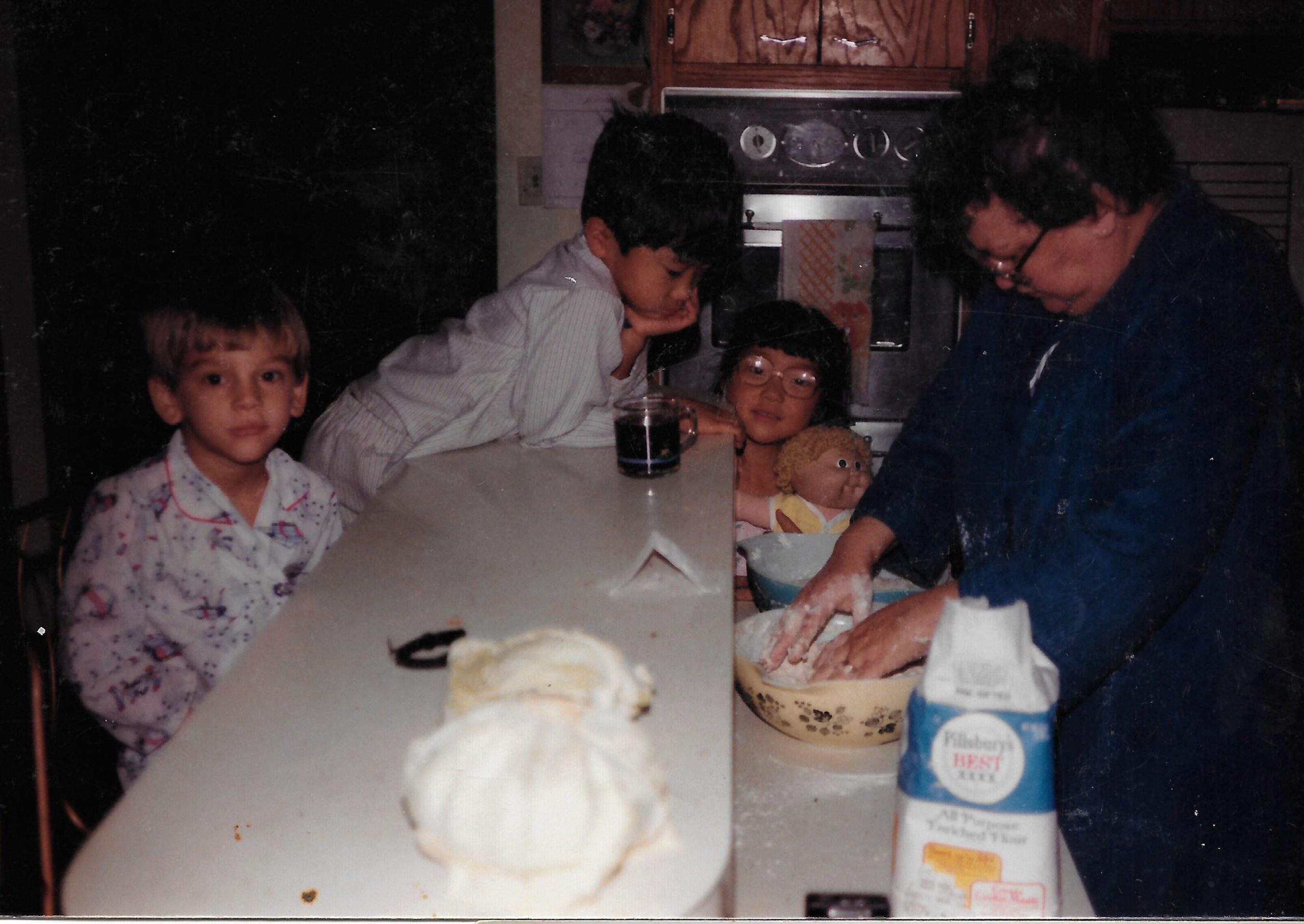
Cooking in grandma’s kitchen
What is your link to Rural America?
My mother was raised in a small northern Indiana town of 500 people, with 21 people in her graduating class. My grandfather was a farm boy raised in that small town. He had one pair of shoes growing up. He was the postmaster, a small business owner who opened a laundry mat, and a manufactured home business to provide affordable housing and services for families in the area.
After serving in the Army, my father married my mother (who dropped out of college) and became a K-12 art teacher. Once our family grew to six, economic needs forced us to move in the hopes of finding better opportunities.
Though we ended up moving away, it continues to be a place where I have a family today. Up until my parents passed away, I spent summers and all holidays there. I have a real deep connection to the pace of life and the hardworking nature that I grew up in. Generosity looks different in rural than it might in an urban setting. When anything happens, people come together and take care of each other. I continue to feel deeply committed to rural communities across the United States.
Tell us about your education and career path. What led you to where you are today?
After graduating from high school, I went to college in Indiana in a town about an hour north of Indianapolis. It is a factory town but a little more of a smaller city setting, really on the edge of rural. During that time, I ended up living and working in a Louisiana town. At the time it was a paper mill town surrounded largely by rural communities. There I worked with young people while I studied political science, religion, and philosophy. Then, I went to graduate school in Los Angeles.
I lived and worked in rural Louisiana, Washington, DC, and eventually Koreatown, Los Angeles. I spent nearly a decade working for non-profit organizations—running HR, fundraising, operating programs, and doing community relations. During this same period, community members and elders embraced me and taught me about community advocacy, organizing, and what it meant to belong. This led me to serve in a variety of volunteer positions. I was elected to a local council and appointed as a Los Angeles City Commissioner. It was this set of experiences that led to my being recruited to the W.K. Kellogg Foundation, where I focused on civic engagement and place-based philanthropy.
I spent nearly a decade working in New Mexico, leading a statewide program. I spent a significant amount of time in rural communities in pueblos, tribal communities, and along the border of the US and Mexico, which is largely rural. If you know that area, it’s called the Colonias. It’s defined by a really severe lack of infrastructure, including running water and electricity. There is a lot of exploitation and a lot of folks who like to live in places where there’s a bit less attention and focus from traditional systems. New Mexico is a largely rural state and the fifth largest landmass in the United States lower 48 with only 2 million people. So, it’s one of the largest pieces of land with very distributed populations.
I spent a lot of time learning that how we think about change, power, community, and how things happen is very different in rural communities. You have to really be attentive to understanding each of those places as distinct. This work, along with deep work related to diversity, equity, and inclusion brought me to McKnight in 2017.
How do you approach wanting to create help and access to resources in different communities without trying to change them?
I feel like I had a real privilege, in both my undergraduate and graduate studies, to get acquainted with thinkers like the late bell hooks, Thich Nhat Hanh, Paolo Freire, and many others. They really helped me see that the power is in understanding that with every place you go and with every person you encounter, there is already strength and a lot of knowledge.
So, I was taught the discipline of listening first. My job as an outsider coming in was to really respect and understand the resilience in the cultures. In many ways,
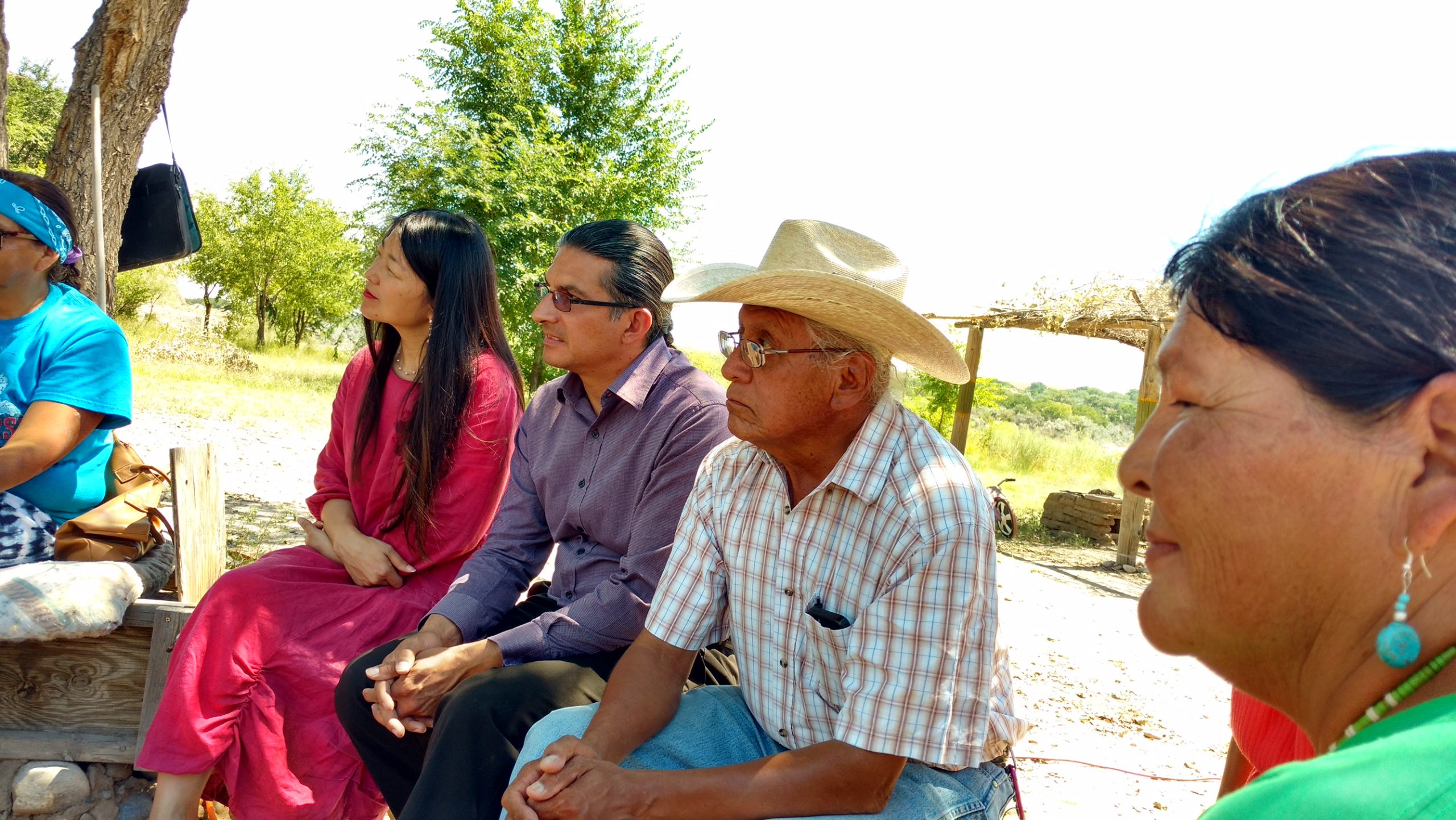
2016 Navajo Nation NM
it’s like people are singing a song that you just can’t hear and they’re dancing a dance that you just can’t recognize as an outsider coming in. What it took, for me, was sitting and listening for hours in hogans with Navajo people and sitting outside of a government office on a Pueblo north of Albuquerque, waiting for the elder to invite me in.
With philanthropy, it really is important for us to show up in so many ways. We must honor, adapt, and learn rather than come in with force. We must understand what we offer and what we don’t. You really learn that in relationships. People have a really deep understanding of their community. They have deep passions and pride and also deep pain. I think philanthropy at its best really understands what they can bring and how to partner well.
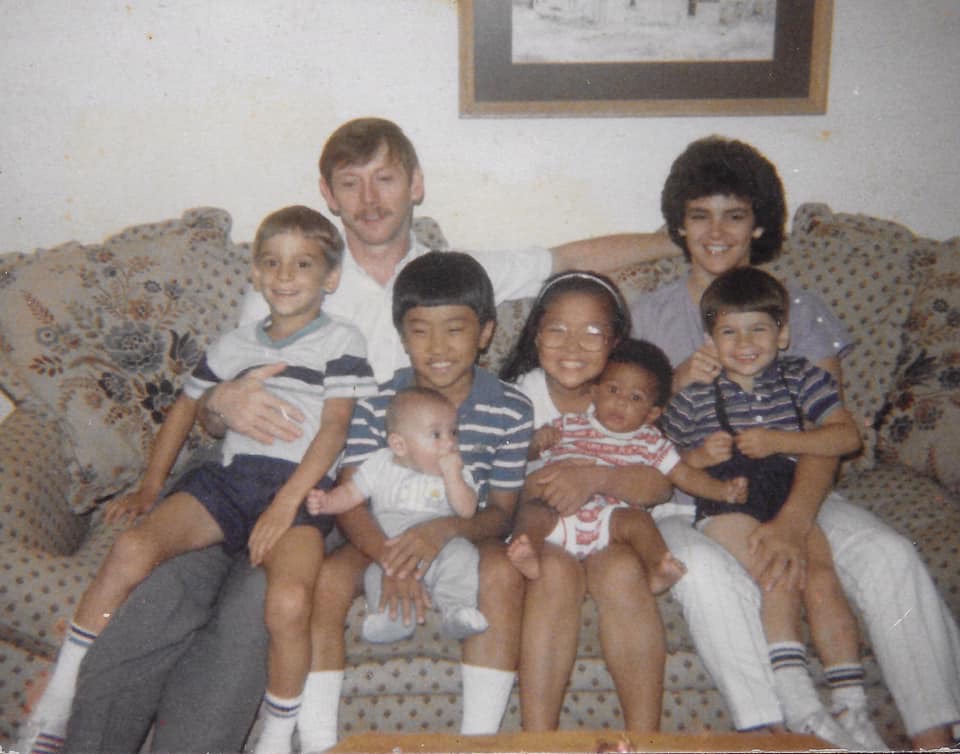
A childhood family photo
How do you lead and create change in your community and how can your community better support rural women?
I have been deeply shaped by thinkers such as Paolo Freire, bell hooks, Thich Nhat Hanh, Octavia Butler, and more recently by Minnesota’s own Kathleen Allen. Each of these thinkers taught me to listen first, to enter with a deep appreciation for the assets in every community, and to seek to connect with the deepest passions and pains as an entry point for change. This approach understands that every community is rooted in its own culture(s), which reflects the history and is also alive and ever evolving. If we think of McKnight as my “community,” we can support rural women’s leadership.
Tell us about a moment you felt discouraged. How did you overcome it?
There are so many different ones where I think the theme is that I felt uncomfortable as an outsider. For whatever reason, you go into a place, and you don’t know the local customs, the local language or the dialect or the accent. You observe so many things and just feel lost.
When I first moved to Los Angeles from Indiana for my master’s degree, I felt completely lost. I had no friends, no family, and I repeatedly got literally lost (this was before mobile phones, let alone GPS). I would just perpetually get lost in these neighborhoods across LA and if you’ve ever been there, it’s sprawling. A couple of times, I actually drove to the airport. I thought, I’m just going to get on a plane and leave everything. I was so stressed out and I felt like I didn’t belong. But then I would go back and think, okay you need to stretch yourself.
Having grown up in the Midwest in predominantly white communities, I felt especially out of place among Korean students. I remember being scolded for not having a rice cooker and being terrified when I was served soup with unpeeled shrimp. The only fish my family served growing up came frozen and breaded from Schwann’s! In terms of overcoming it, it took time. It was a deliberate reframing of each experience to say, what can I learn from this and how can I accept this is what it’s going to take to adapt?
I invested time in making friends, I agreed to tutor a number of Korean students, and approached the work as a co-learning opportunity. When I got lost, I gave in to it. It was a way to get to know the area better. I gave up on direct routes and tried to take in the new neighborhoods and communities I stumbled upon. I would decide to try to look around and understand the kinds of communities I was driving through, to really get to know landmarks and understand how to navigate to make it my own in a way.
But it was tough. I think those skills of being able to observe and accept that you’re just not going to know things and accept that you’re going to feel a lot of different things is helpful. It is really something that I still do if I go into a place where I feel uncertain about the customs, the language, and don’t know people. Just try to observe and take in the experience and accept it for what it is. An opportunity to be uncomfortable and to learn something, and not to feel insecure about it.
If you could give one piece of advice to your former self, what would that be and why?
One piece of advice I’d give to my former self is to not feel as though I had to shoulder everything. I can take care of myself along with taking care of others. For me, as is the case for many women, we carry psychic stresses at home in our nuclear and extended families. Along with being the one that holds our organizations and communities together through paid and volunteer work. There’s something beautiful and powerful about inheriting the mantle of the matriarch, but there’s also something that can be isolating and overwhelming about it. We often shoulder more of the burden than is reasonable. I had to learn that I deserve to be cared for, too. I’d tell my younger self that it’s okay to say no and not to carry the weight of the world on my shoulders. I can share that and have a little more fun.
Is there a quote, phrase, or principle that you live by?
Over twenty years ago, while I was doing work in LA, living in a hippie eco-village, and riding my bike around town, I learned the phrase, “reciprocal accountability.” This means that we’re accountable to one another—whether it’s a personal relationship between a parent and child, a working relationship between colleagues or a supervisor and direct report, or in the civic realm between an elected official and the community they serve. Often we are taught, formally or informally, that responsibility goes only one way. That misses half of the equation. It is not power over or power under, it is power with, a deep understanding of our mutuality. I try to think about putting myself in someone else’s shoes. But in a deeper way that I believe that I’m accountable to every relationship and that is power with. I try to live this out in all aspects of my life.
Bonus Q: How did you end up in a Hippie eco-village? We must hear more!
You know, I didn’t know what I was going to do after graduate school. I had done 7 years of education in religion and politics. I was actually on the track to become an ordained minister. However, during my master’s degree, I started having all these stress nightmares. I felt really confined. I’d think about my life experiences and all the different people I’d met and what I’d learned. I felt like the world was much bigger than one particular way of thinking about religion or meaning, which was a very big deal because I had been raised in a really strong protestant Christian family. So, I had no clue what I was going to do but I knew I couldn’t go down that path to ordination.
I was on a trip, and I met this group of well, kind of hippies, who had bought a building outside of the traditional system. They decided to rehabilitate buildings that had been impacted after the Rodney King verdict came out in 1992, which was one of the big flashpoints in the country around race, not dissimilar to what happened after the murder of George Floyd here a year and a half ago. This group of folks who had planned to buy property and do a hippie village out in a rural area decided to stay in the city. They’re one of the only urban ecovillages in the world– so I went!
I met them and they had to vote you in. I will say, I was voted in the first night, which is not supposed to happen! There is supposed to be a community vote and everything. I ended up living there for maybe a year and a half or so. It was low-income housing and they would give you even cheaper rent if you got rid of any cars and just used a low carbon footprint a.k.a. rode a bike. We all did small businesses. There was a bicycle repair shop, and we did education for young people. I learned about composting, and we had guests come from all over the world. Everything was rehabbed by hand. Lots of stories there. It’s called the Los Angeles eco-village.
